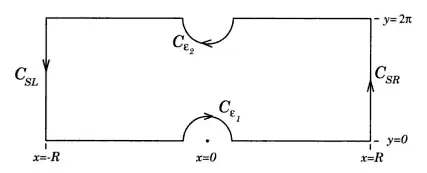Let $$f(z) = \frac{z}{e^z-1}$$
$f$ has poles at $z = 2 \pi i n$ where $n \in \mathbb Z$ and $n \neq 0$. Let $C$ be the rectangular contour with vertices at $0, R, R+i\pi$ and $i\pi$ but indented at 0. Because the residue is $0$ there, the indentation does not add to the value of the integral.
Then, as $R \to \infty$:
$$0=\oint_C f(z)\, dz = \int_{0}^\infty f(z)\, dz-\int_0^\infty f(z+\pi i)\,dz-i\int_0^\pi f(iz)\,dz+\pi^2=\\
\int_{0}^\infty f(z)\, dz+\int_0^\infty \frac{z+\pi i}{e^z+1}\,dz+\int_0^\pi \frac{z}{e^{iz}-1}\,dz
$$
Taking the real parts of both sides yeilds
$$0 = \int_{0}^\infty f(z)\, dz+\int_{0}^\infty \frac{z}{e^z+1}\, dz-\int_0^\pi \frac{x}{2}\,dz$$
so
$$\frac{\pi^2}{4}=\int_{0}^\infty f(z)\, dz+\int_{0}^\infty \frac{z}{e^z+1}\, dz$$
By summing and integrating both series as was done by Ron Gordon, we find
$$I=\int_{0}^\infty f(z)\, dz=\sum_{n=1}^\infty \frac{1}{n^2}$$
$$J=\int_{0}^\infty f(z)\, dz=\sum_{n=1}^\infty \frac{(-1)^{n+1}}{n^2} = \frac{I}{2}$$
and therefore
$$\frac{\pi^2}{4}=I+\frac{I}{2}$$
therefore
$$I=\int_{0}^\infty f(z)\, dz = \frac{\pi^2}{6}$$
